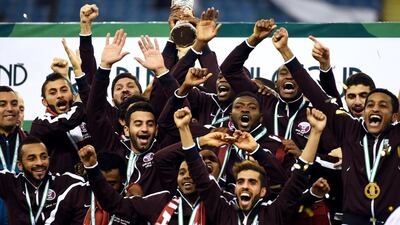It is a cold, hard fact of football: countries with tiny populations generally do not beat big ones with deep wells of talented players.
So how embarrassing might the score be when Qatar – smallest host in World Cup history, with just 282,750 citizens – play the opening game of their 2022 tournament against, for example, titans Brazil or Germany? At best 5-0? At worst 10-0?
“Impossible, impossible,” said Ivan Bravo, the former Real Madrid administrator working to prevent such a loss from damping home-town excitement over the Middle East’s first World Cup, in 2022.
“They will be ready to have a very good team, a competitive team.”
Bravo is confident that the world will get behind the Qatari side that will represent the nation when they host the tournament.
“It’s thrilling,” he said. “There’s always an underdog story, the little guy trying to punch above their weight story, and I think people will get behind it.”
Qatar qualify automatically as host.
“The players know what an opportunity this is,” Hassan Al Thawadi, Qatar’s chief World Cup organiser, said. “I’m sure they won’t disappoint.”
Aspire Academy is a source of such confidence. It trains local kids and others unearthed by a mammoth international scouting programme – named “Football Dreams” – that screens hundreds of thousands of teenagers from 16 countries in Africa, Asia and Latin America.
The reach and size of that talent-search and Qatar’s history of recruiting overseas athletes to represent it internationally led to suspicions it could naturalise foreign footballers in bulk for the World Cup.
Bravo insists that is not the plan. He said Qatar’s ambition for 2022 is to field a team of Qataris and have “seven, eight, nine, 10” Aspire-trained recruits from Football Dreams playing for other nations.
Aspire’s facilities rival those of Europe’s best clubs.
Under a giant dome, it has a full-sized indoor pitch with an exhortation from Pele on one wall: “Success is no accident. It is hard work, perseverance, learning, studying, sacrifice and most of all, love of what you are doing or learning to do.”
Young Qatari players have been embedded with professional teams in Spain, Monaco, Austria and a club Qatar bought in Belgium to immerse them “in a professional football environment 24 hours a day”, which is something Doha lacks, “because of the league, empty stadiums”, Bravo said.
The 2016 Rio Olympics and 2018 World Cup in Russia, if Qatar qualify, will also be opportunities to hone players for 2022, as well as the Asian Cup next month, at which Qatar opens competition against the UAE on January 11.
While the pool of native Qataris is tiny – roughly only 4,000 boys are born in the country each year – Bravo says Aspire scouts see nearly all youngsters so no potential talent slips through.
Motivating them, though, can be challenging: thanks to the nation’s oil-and-gas wealth, Qataris are the world’s second-richest people per capita and – unlike slum kids in Brazil or Africa – do not need football as an escape.
“You’re in a country where even attendance to training can be difficult,” Bravo said.
“There’s a bit of a misperception about everybody in Qatar: they’re wealthy kids, they are wearing Rolexes and driving SUVs. It’s not the case. A lot of our kids come from more humble or medium-income situations.”
A breakthrough came in October when Qatar’s Under 19 team beat China, Myanmar and North Korea to become Asian champions, qualifying them for the Under 20 World Cup next year in New Zealand. All the players are Aspire products and, Bravo said, none were naturalised.
“There you have the proof of what we are trying to do,” he said, “which is to do this with the local players, because that is what this country wants.”
“It’s amazing,” said Qatar’s sports minister, Salah bin Ghanem bin Nasser Al Ali. “We are the least populated nation in Asia but we won. We are the champion of the most populated continent.
“Think about it.”
Qatar’s senior team also won the regional Gulf Cup of Nations in November, beating host Saudi Arabia – with a population more than 100 times greater – in the final.
Such successes are ammunition against critics who argue that World Cup organiser Fifa should not have picked such a football minnow as host.
“Because it’s a small country they say, ‘Why is the World Cup here’?” said Tareq Sulaiman, a midfielder on the championship-winning U19 team. “This is the chance for us to show them that Qatar will do something good.”
sports@thenational.ae
Follow our sports coverage on Twitter @SprtNationalUAE

